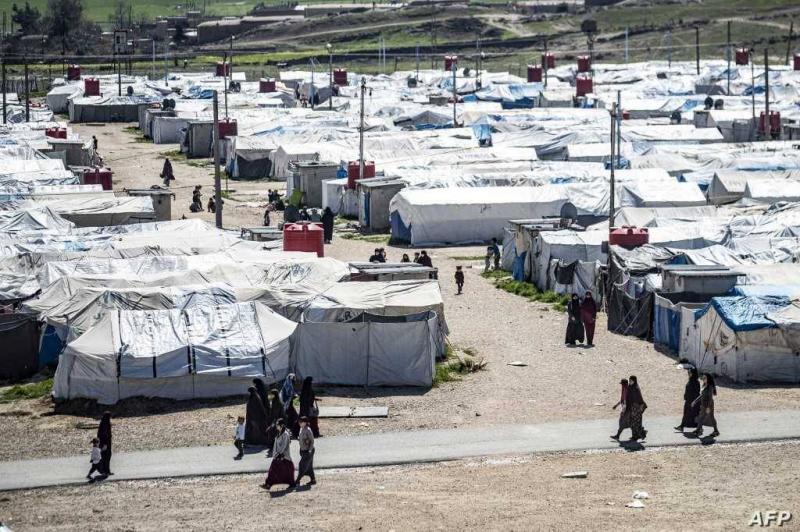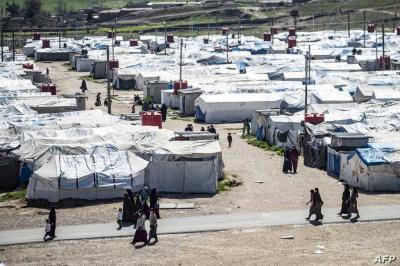Legal experts told the "Independent" newspaper that the British government's decision to revoke the citizenship of dozens of women who joined the terrorist organization ISIS aims to prevent any chances for them to return to the country. London seeks to enact a new law that would allow the stripping of those women's citizenship without prior notification, which has caused discontent among many human rights organizations. Some have stated that such actions could harm their children and pose a threat of turning them into dangerous extremists once they reach maturity.
British mother Sarah, stranded in a camp for ISIS families, told the British newspaper that she learned of her citizenship revocation over a year after it occurred, purely by chance, as the UK government "failed to inform her." She currently resides with her children in the Al-Roj camp, a sprawling facility in the northeastern Syrian desert housing over 2,500 foreign women and children, including many women and girls who were born and raised in Britain like Sarah (a pseudonym) and Shamima Begum, who left the UK years ago to live under ISIS's "caliphate."
Legal experts believe that stripping Sarah and others like her of British citizenship will effectively eliminate any possibility of their return to the UK. London’s steps toward enacting this new law have raised concerns among many activists, NGOs, and some British lawmakers who argue that the UK should take responsibility for its citizens instead of leaving them forgotten abroad. Some organizations have expressed that these women and girls are considered victims of human trafficking, having been brainwashed through websites and social media platforms, and therefore need help and support rather than denial and abandonment.
The British human rights organization "Reprieve" emphasizes its commitment to assist individuals like Sarah and to help them return to the UK, even if they might face prosecution for alleged terrorist activities. However, those involved with the organization believe that citizenship revocation will close all avenues for achieving that goal. Sarah, who suffers severe malnutrition and struggles to walk, found out she had been stripped of her citizenship a year earlier after her family learned of the issue by chance.
She expressed her shock at learning of the revocation, as she had not been formally informed, saying, "The UK is the only home I know, and all of my family is there." Sarah pointed out that this decision has left her in "a particularly unfair dilemma for the children of affected women." She noted that she is religiously committed and had to go with her husband to Raqqa in Syria before ISIS members confiscated her phone and identification documents after she separated from her children's father in 2014. She lamented, "I regret the day I agreed to go to Syria with my husband. Our government should bring us back, and we are ready to face any trials and accept the decisions of the judges... All I want is to return to my mother and father."
Sarah is one of more than 900 individuals believed to have traveled to Syria and Iraq from the UK to join ISIS, with estimates suggesting that half of them have returned, and 40 have faced legal action.
"Misleading and Dangerous Justifications"
It is believed that there are currently 20 British families held in northeastern Syria, including a British grandmother known as "D4" for legal reasons, who also lives in the Al-Roj camp and was detained by Syrian Democratic Forces while trying to flee to Turkey in early 2019. This woman was stripped of her citizenship in December 2019 but was only notified of the decision in October 2020 after her lawyers sought to repatriate her.
"D4" appealed the decision, and the High Court ruled in August that the government's action was "invalid and of no effect," as the government exceeded its legal authority by removing her British citizenship without informing her. Following this ruling and others, the London government is attempting to pass a new citizenship bill that would allow them to strip citizenship without prior notice to the individual concerned.
In this context, the "Reprieve" organization believes that the proposed law aims to inflict "maximum harm and injury" upon women and children in Syria. However, a spokesperson for the Home Office responded that "British citizenship is a privilege, not a right." The Home Office has repeatedly confirmed that it attempted to inform those who joined ISIS of the citizenship revocation decision, according to current laws, but was unable to do so for reasons beyond its control.
The ministry explained that the new bill would enable authorities to strip citizenship in cases where the relevant individual could not be notified of the decision, which is currently impossible under existing laws. Nevertheless, Reprieve’s director, Maya Foa, insists that the Home Office is misleading the public with such justifications, stating that if the law is passed, Minister Priti Patel would have the power to deprive others of all the rights that a British passport affords them through vague interpretations regarding the "public interest." Foa described the citizenship revocation as "a terrible concession by the government regarding its responsibility to protect British citizens."
Foa confirmed that the new law would effectively mean the end of the right for the accused to contest the citizenship revocation decision, as they would only learn of it after the legal timeframe for appeal had expired. A report by the organization published this year indicated that 63% of those stripped of their citizenship—including Shamima Begum—were victims of human trafficking. Foa clarifies, "The government does not distinguish between potential victims of trafficking and individuals who may have committed crimes," adding that this could open the door for terrorist groups to exploit more teenage girls in the future.




